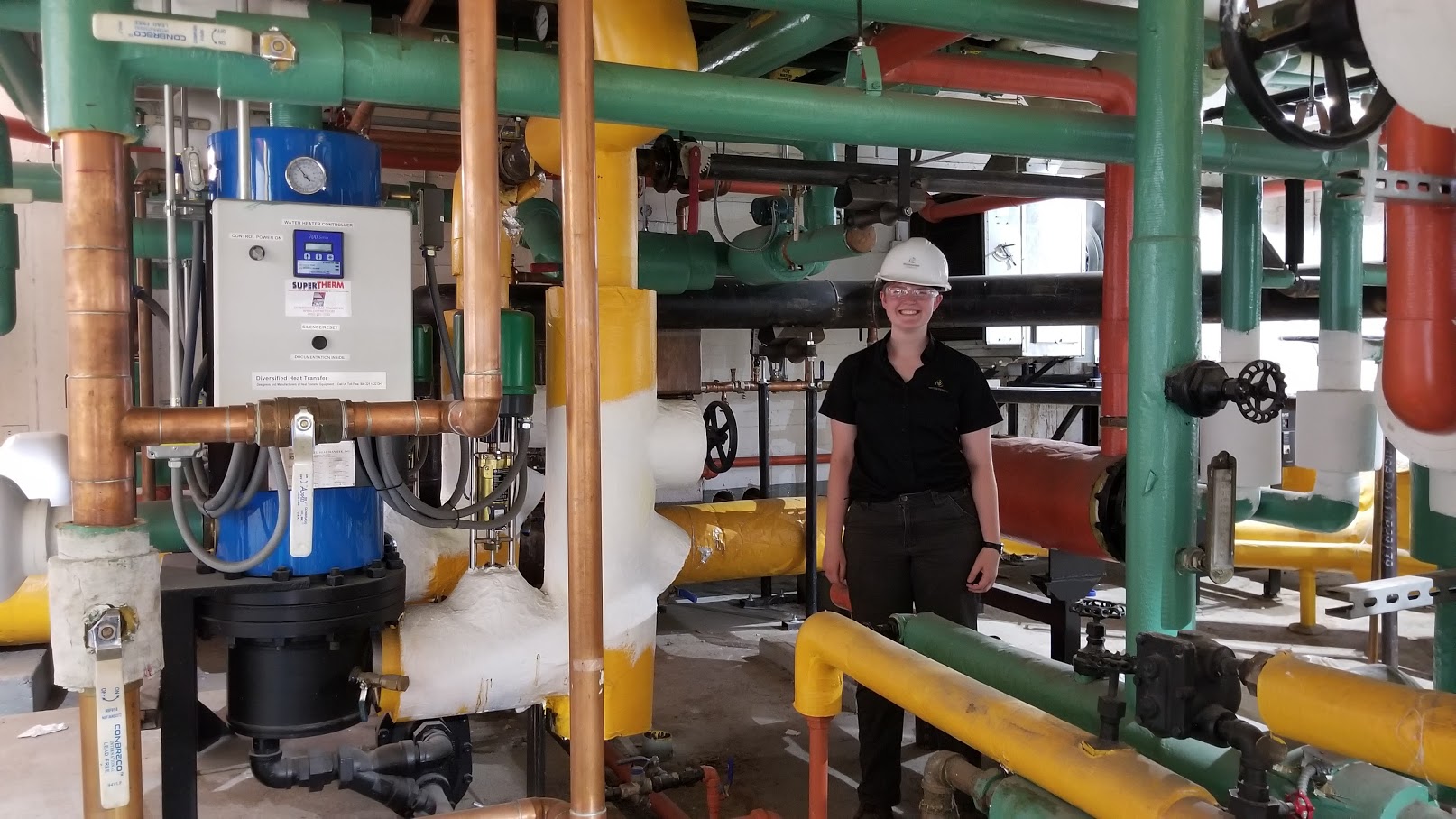This summer, I had the opportunity to intern at Ecosystem as a project engineer intern working on the construction team. Working at Ecosystem, it’s hard to explain what it is you do – it’s kind of HVAC, but more innovative and interesting; kind of sustainability, but we’re not planting trees; kind of construction, but we’re not bound by the design-bid-build model so we’re more agile. In short, the question “so what are you doing this summer?” was a little complicated to answer for me.

Photo taken in a StuyTown Steam Hub for National Intern Day. PC: Lucas Taub
The most efficient way I’ve settled on to answer this question is: “I worked in construction engineering for an energy efficiency company doing retrofits in the city.” As a Project Engineer Intern at Ecosystem, I supported projects in Manhattan and Brooklyn. This post isn’t sponsored at all, but I wanted to collect my thoughts about the experience and share what I learned.
I learned a lot about HVAC and the energy efficiency industry. As someone who previously didn’t know what a chiller was or how it worked, I gained a lot of knowledge in fluid dynamics, heat transfer, and thermodynamics as a first year that is mostly taught in the third year of engineering programs.
HVAC is all about moving heat from one place to another in order to regulate the temperature of a space. As an industry, it has traditionally been siloed, with boiler, chiller, steam (in NYC), and domestic hot/cold water systems designed separately. Ecosystem goes into old buildings to perform retrofits. When drafting a proposal, the engineers audit the entire system to find where the losses are, and how waste heat can be reused. For example, the chiller produces a lot of heat that is rejected to the cooling tower – could you use that instead to preheat domestic hot water?
Ecosystem’s engineers are balancing the demands of building loads with energy costs, permitting, equipment lead times, space restrictions in old buildings, client requests, the need for continuous building operation, among many other constraints. In that kind of environment, you have to be looking at the whole picture. Ecosystem describes itself as “energy efficiency experts obsessed with eliminating inefficiencies,” and it taught me that with a little forethought and creativity, you can save immense amounts of time and money, although there can be value in figuring out some things as you go.
I found a lot of meaning in my work at Ecosystem, and I think it’s a really good example of a workplace culture that encourages its employees to contribute to company growth. I believe this is because of a few (unofficial) core tenets: mentorship, responsibility, and flexibility.
As the only intern in the New York office, I thought I would be lonely, but I was welcomed with open arms by the entire team, even those who I didn’t work with directly (and who I didn’t even meet—shoutout to IT!). Everyone took the time to explain their work to me, no matter how busy they were. Even as an intern, I was given important work to do and felt empowered to ask questions and make decisions. For example, I performed air permitting calculations that will be submitted to the New York Department of Environmental Conservation when evaluating the permit needed for the project. Ecosystem trusts its employees and makes them responsible for delivering on outcomes, which makes it such a satisfying place to work.
Work-life balance also matters a lot at Ecosystem. Everyone understands when life happens – for example, my supervisor had a two-hour long commute for part of the summer, so he adjusted his schedule to beat traffic, and folks worked from home when they were moving apartments and needed to wait for stuff to get picked up. A lot of employees work in the bigger Canadian offices and commute down to help the New York team, so the office has a big videoconference culture. I learned that it’s not about facetime in the office or behind a desk: it’s about the work you’re able to get done.
Finally, I would be remiss if I didn’t give a huge shoutout to my mentor Trevor. He taught me how to negotiate and communicate with contractors and engineers more effectively in order to move the project forward, and let me pick his brain about his career and life as an engineer during our commutes to and from sites. Trevor really embodies the Ecosystem ethos, and the most important thing I learned from him is to question why things were done the way they were – often, there isn’t a good answer and they can be improved.
I’ll miss everyone who I worked with, and I’m really excited to stay in touch with everyone in the future and hear about how things are doing. Needless to say, I grew a lot in one summer, and I can’t wait to apply my new engineering mindset to new problems!
Comments